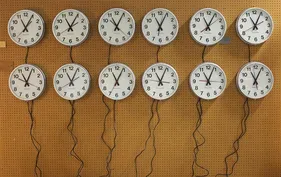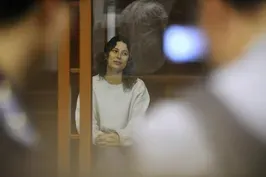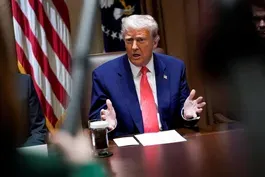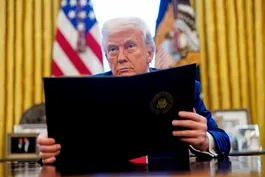
House GOP passes budget framework to work on Trump agenda
Clip: 4/10/2025 | 4m 17sVideo has Closed Captions
House Republicans pass budget framework to begin work on Trump’s congressional agenda
In a dramatic vote, House Republicans passed a $5 trillion budget framework that kick-starts the process for President Trump’s agenda on Capitol Hill. It came less than a day after hardline conservatives refused to support it. Congressional correspondent Lisa Desjardins reports.
Problems with Closed Captions? Closed Captioning Feedback
Problems with Closed Captions? Closed Captioning Feedback
Major corporate funding for the PBS News Hour is provided by BDO, BNSF, Consumer Cellular, American Cruise Lines, and Raymond James. Funding for the PBS NewsHour Weekend is provided by...

House GOP passes budget framework to work on Trump agenda
Clip: 4/10/2025 | 4m 17sVideo has Closed Captions
In a dramatic vote, House Republicans passed a $5 trillion budget framework that kick-starts the process for President Trump’s agenda on Capitol Hill. It came less than a day after hardline conservatives refused to support it. Congressional correspondent Lisa Desjardins reports.
Problems with Closed Captions? Closed Captioning Feedback
How to Watch PBS News Hour
PBS News Hour is available to stream on pbs.org and the free PBS App, available on iPhone, Apple TV, Android TV, Android smartphones, Amazon Fire TV, Amazon Fire Tablet, Roku, Samsung Smart TV, and Vizio.
Providing Support for PBS.org
Learn Moreabout PBS online sponsorshipAMNA NAWAZ: In a dramatic vote, House Republicans today passed a $5 trillion budget framework that kick-starts the process for President Trump's agenda on Capitol Hill, this less than a day after hard-line conservatives refused to support it.
Our congressional correspondent, Lisa Desjardins, joins me now to explain.
So, Lisa, this was a hard-won vote.
Let's talk about that in a second.
But first walk us through the framework of this bill.
What does it mean potentially?
LISA DESJARDINS: That's right.
This is not just a framework.
This is the framework for the Trump agenda in Congress.
It's part -- it how his key promises -- if they get passed, it will be because of this.
So let's take a reminder of what this bill outlines exactly.
First, this would be tax cuts of up to $5.3 trillion, including extending Trump's first-term tax cuts, spending cuts, significant ones.
But that is still to be determined how much.
This would increase the debt ceiling likely through the end of next year.
Now, it's interesting, Amna.
Today, the Congressional Budget Office came out and said the kinds of tax cuts that this allows, it could add an additional $6 trillion to the deficit, depending on what else is in this bill.
Now, Speaker Johnson and Republicans want to get this done now, because it is the first step.
They want to get to the second step, the detailed bill by summer.
There are political reasons for that, but there are more than that.
There are also some economic ones too.
REP. MIKE JOHNSON (R-LA): We know that the debt limit cliff is approaching us pretty quickly here.
We know that markets have been a little unstable.
They want to know that Congress is on the job.
And I'm here to tell you that we are.
The Article I branch of this government, the U.S. House of Representatives and the U.S. Senate are going to do our job.
LISA DESJARDINS: You mentioned this was difficult.
It barely passed 216 to 214.
They really couldn't spare very much on this, at stake here, nothing less than Trump agenda, but also every person in this country, their tax rates on the bank accounts for America in the future, and Republicans' political future going ahead.
AMNA NAWAZ: Let's talk more about the vote then, because yesterday there were some 20 House Republicans who opposed this bill.
The bill didn't change.
So what did to get it across the finish line?
LISA DESJARDINS: At least 20.
It could have been even more than that.
They have real issues with the idea that perhaps this added to the deficit.
And that's why they were holding back on it.
What has changed?
Senate Leader John Thune and Speaker Johnson have promised them in private talks that they will, personally, they are committed to these kinds of cutting of spending to about $1.5 trillion.
Now, it's a handshake deal, but that would be an unprecedented level of spending cuts.
REP. JODEY ARRINGTON (R-TX): And most importantly for me, a commitment from the leadership of the House that we will not put a bill on the floor of our chamber that adds to the national debt, which is a deferred tax on our children.
LISA DESJARDINS: Two Republicans did vote no because they said this will raise the deficit.
That's Thomas Massie and Victoria Spartz there.
Now, is everyone on the same page here, House and Senate?
No, I don't think they are.
They want to be on the same page, but the details are what matter here.
That's going to be difficult.
I'd say maybe they're in the same section of the library.
AMNA NAWAZ: OK, well, we should note the House passed another major Republican bill today.
This one has to do with voting.
What would it do and will it become law?
LISA DESJARDINS: Right.
This likely will not pass the Senate, but I want to talk about it because it is a big Republican priority.
This is called the SAVE Act.
Let's talk about what's in it.
This bill would require proof of citizenship in order to register to vote in federal elections.
Currently, voters have to swear, sometimes they sign, that they are citizens.
This bill, as I said, will likely die in the Senate.
But opponents say it is part of what they see as an assault on voting rights as voter suppression, because they note that millions of Americans don't have access to these kinds of documents in an easy way.
They also note that, from what we know, there is a microscopic level of noncitizens voting in this country, very small.
Republicans say, well, if it is so small, why not wipe out the chance altogether?
They know that voter I.D.s at the polls generally is a popular issue with voters.
This is something we have seen them run on and they will again.
Now, the next election, depending on the balance of power in the U.S. Senate, this bill could come up again and it is something we want to watch in the long term.
AMNA NAWAZ: All right, another busy day on Capitol Hill.
Lisa Desjardins covering it all, thank you.
LISA DESJARDINS: You're welcome.
Ditch the switch? Senators divided over daylight saving time
Video has Closed Captions
Ditch the switch? Senators debate future of daylight saving time (5m 14s)
Food banks feel pain of high prices, government cuts
Video has Closed Captions
Food banks feel the pain from higher prices and cuts to government programs (6m 22s)
Musician Nile Rodgers reflects on the roots of his artistry
Video has Closed Captions
Musician Nile Rodgers reflects on the roots of his artistry (4m 23s)
News Wrap: Ksenia Karelina released to U.S. in prisoner swap
Video has Closed Captions
News Wrap: Ksenia Karelina released to U.S. in prisoner swap with Russia (6m 35s)
Senegal struggles with climate despite promises of help
Video has Closed Captions
Senegal struggles to cope with climate change despite promises of help from other nations (8m 37s)
Trade war solution 'may take a while,' AEI's Scissors says
Video has Closed Captions
Solution to U.S.-China trade war 'may take a while,' AEI's Derek Scissors says (5m 50s)
Trump defends tariffs on China as markets take another dip
Video has Closed Captions
Trump defends enormous tariffs on China as markets take another dip (3m 59s)
Trump directs DOJ to investigate ex-administration officials
Video has Closed Captions
Trump directs DOJ to investigate former administration officials who criticized him (5m 26s)
Providing Support for PBS.org
Learn Moreabout PBS online sponsorshipSupport for PBS provided by:
Major corporate funding for the PBS News Hour is provided by BDO, BNSF, Consumer Cellular, American Cruise Lines, and Raymond James. Funding for the PBS NewsHour Weekend is provided by...



















